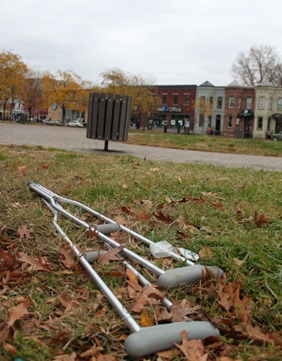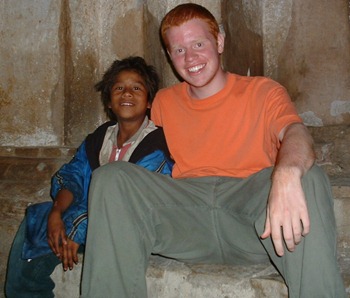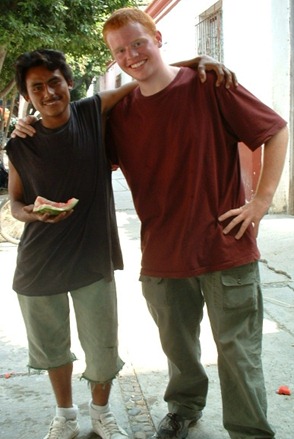I recently read a sermon entitled, How Much Is Enough?, by Gordon Cosby, founder of the Church of the Saviour here in Washington, DC. The sermon, which dates from 1990, talks about the ways in which our lack of trust in God for our daily needs creates a barrier between us and other people in our lives – particularly between us and those in our society that are living on the margins – the homeless, the very poor, the outlaw. How can we, he asks, expect to imitate Jesus in his love for the poor and the outcast when our privilege makes us so uncomfortable around the very people that Jesus spent the most time with?
 Cosby’s questions convict me. Here in DC, I regularly encounter homeless citizens who linger in the places I frequent – on street corners and in parks, in front of the pharmacy and near the market. These folks serve as constant reminders of the material, social and other advantages that I have received, through no merit of my own. They also remind me of the injustice that my privilege props up; they, by their very presence, reveal my own complicity in the systems of oppression that allow our civilization to function.
Cosby’s questions convict me. Here in DC, I regularly encounter homeless citizens who linger in the places I frequent – on street corners and in parks, in front of the pharmacy and near the market. These folks serve as constant reminders of the material, social and other advantages that I have received, through no merit of my own. They also remind me of the injustice that my privilege props up; they, by their very presence, reveal my own complicity in the systems of oppression that allow our civilization to function.
And I avoid them. When I see someone begging on the street, I walk quickly and avoid eye contact. If they do manage to break through my defenses, I am quick to say, “no, sorry.” I put on a smile, a facsimile of compassion, and I keep walking. To some extent, I avoid homeless and marginalized people because of the way they reveal my own privilege and complicity in oppressive systems; but my deepest reason for avoiding contact is that I fear that if I make myself vulnerable to the poor, they will take advantage of me.
I remember when I lived in Mexico, I quickly learned to shut the beggars out. Only in the most extreme cases would I be moved to give money to any of the hundreds of pordioseros I saw every day. Even when I did occasionally give money, it was a false act of compassion: I sought to assuage my guilt and disgust by buying an indulgence. I never felt I could really get close to the poor of Mexico for the same reason that I now feel so alienated from the poor of Washington, DC: I did not know how to have a real relationship with someone of such a vastly different social and economic class than me. I struggle to believe that I could ever have a relationship with a street person that was not ultimately based in the question of how much money or other assistance I might give. I want to be loved and respected for who I am, and I do not like the idea of being seen by others primarily as a source of income, rather than as a person.
sought to assuage my guilt and disgust by buying an indulgence. I never felt I could really get close to the poor of Mexico for the same reason that I now feel so alienated from the poor of Washington, DC: I did not know how to have a real relationship with someone of such a vastly different social and economic class than me. I struggle to believe that I could ever have a relationship with a street person that was not ultimately based in the question of how much money or other assistance I might give. I want to be loved and respected for who I am, and I do not like the idea of being seen by others primarily as a source of income, rather than as a person.
Could I possibly develop a true friendship with a homeless or very poor person if we remained so starkly different in our financial and social situations? Would I not have a responsibility to share out of my relative abundance, lowering my standard of living to help my brother or sister who has unmet needs? As Jesus is quick to point out: My own fear of losing wealth, status and security is an almost insurmountable barrier to living in the Kingdom.
The Kingdom, after all, consists in loving God with all our heart, mind, soul and strength, and loving our neighbor as ourselves. I do not truly love God if I am unwilling to lay down everything that gets in the way of total obedience to Jesus; and I do not truly love my neighbor if I am not willing to surrender anything that presents a stumbling block to loving relationship.
 What is the next step for me as I seek to live more fearlessly into the reality of Jesus’ Kingdom? How am I to connect with Christ’s presence within myself, and within all of those whom I share life with? I think it will be important to open myself to relationship with street people, and others who make me nervous. I think that God calls me to make eye contact, to stop and speak with those who ask me for money, to get to know each person on a human level.
What is the next step for me as I seek to live more fearlessly into the reality of Jesus’ Kingdom? How am I to connect with Christ’s presence within myself, and within all of those whom I share life with? I think it will be important to open myself to relationship with street people, and others who make me nervous. I think that God calls me to make eye contact, to stop and speak with those who ask me for money, to get to know each person on a human level.
I believe God calls me to step beyond the fear of being used, of being seen only as a pay day. Just as disparities of wealth make it hard for me to relate to the poor as brothers and sisters, I must see how these disparities make it hard for them to do the same. I cannot expect others to break through the social consequences of injustice if I am not willing to take the first step of treating others as if they were the Lord Jesus himself. If this means being treated like a meal ticket by those I am called to love, so be it – what is that suffering compared with what Jesus himself has carried?
All of us, rich and poor, are suffering from the alienation that comes when we try to be self-sufficient. In our lack of faith, we try to play God, storing up the resources we need for the future, not trusting that God will provide for our daily needs. If we are to break out of the spirit of defensiveness and scarcity, we must truly believe that God will stand with us no matter what happens – we must believe that we are truly safe, in the most profound sense, in our Father’s world.
 It is only from this sense of deep safety that we can be empowered to challenge the powers of darkness and oppression that keep us separated from our brothers and sisters. It is only through very tangible trust in the Lord that we can take the risks necessary to live in the Kingdom and invite others in. It is only through deep trust in the power of God that we can say with Peter, “Silver or gold I do not have, but what I have I give you. In the name of Jesus Christ of Nazareth, walk.”(1)
It is only from this sense of deep safety that we can be empowered to challenge the powers of darkness and oppression that keep us separated from our brothers and sisters. It is only through very tangible trust in the Lord that we can take the risks necessary to live in the Kingdom and invite others in. It is only through deep trust in the power of God that we can say with Peter, “Silver or gold I do not have, but what I have I give you. In the name of Jesus Christ of Nazareth, walk.”(1)
–
1. Acts 3:6